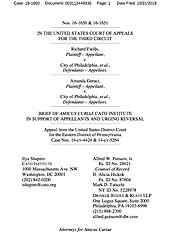Learn more about Cato’s Amicus Briefs Program.
Two people were peaceably and non-disruptively recording the police when they were detained. Because they were not actively challenging or criticizing the police at the time they were detained, the federal district court dismissed their First Amendment challenge. Now before the U.S. Court of Appeals for the Third Circuit, Cato has filed an amicus brief urging the court to reverse that decision and uphold the right of everyone to record the police in public. People have the right to gather news from any legal source about the manner in which government operates. Our free society depends on people being able to put forward the truth of what actually occurred in interactions with government agents. This right extends to all members of the public, not just credentialed press. It protects everyone, both the chronicler and the poet. The lower court ignored all this and instead focused on the lack of expressive intent, rather than the behavior of gathering information. As the Supreme Court held in First Nat’l Bank v. Bellotti (1978), “the First Amendment goes beyond protection of … the self-expression of individuals to prohibit government from limiting the stock of information from which members of the public may draw.” Indeed, if the lower-court ruling is allowed to stand, imagine the effect on the public in chilling those wishing to use recordings to hold the police accountable. The court should recognize that the First Amendment protects everyone’s right to non-disruptively record the police in public, regardless of motivation, and reverse the lower court.
]
